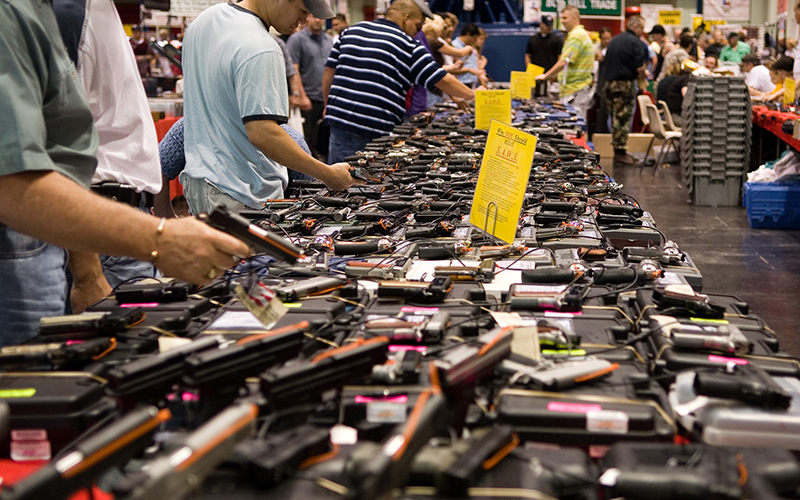
People shop at a gun show in Houston. Gun sales in Arizona and the nation rose steadily last year before dropping sharply at the first of the year, which experts attribute to the election outcome, before rebounding. (Photo by M&R Glasgow/Creative Commons)
WASHINGTON – Gun sales in Arizona have started to rebound after a brief January slump that experts attribute to the inauguration of President Donald Trump.
The latest FBI background check data show that gun sales in Arizona last year peaked at 44,887 in December, before plunging to 31,366 in January. That mirrored national sales, which hit a high of 2.8 million in December before falling to just over 2 million a month later.
But sales in March had bounced back to 38,170 in Arizona and 2.4 million nationally.
The numbers are just the latest in a rollercoaster ride of gun sales driven up by what experts said were typical reactions to the possible election of a Democrat, Hillary Clinton, and a subsequent drop when gun-friendly Republican Trump moved into the White House.
The sensitivity to partisan politics is one of the few things predictable about gun sales, one expert said – along with the general upward trend over time.
“The gun-sale market is really volatile,” said Larry Gould, law professor at Coconino Community College and expert on police policies and procedures. “If you look back over the last 17, 18 years you see that it goes up and down, up and down, but the general trend has been upward.”
Marc J. Victor, an Arizona attorney, said gun show operators and gun sellers likely would have preferred a Clinton win in 2016, even though she is less supportive of Second Amendment rights, because of the business windfall her election might have meant for them.
“Trump is not going to make it hard for people to buy guns, so no one is rushing out to buy guns,” Victor said. “Trump has been relatively clear on the Second Amendment and him wanting to protect Second Amendment rights, so the gun community is pretty happy with those decisions.”
Gun shop owners in the state reported similar peaks and valleys during the election season.
Douglas MacKinlay, owner of Diamondback Shooting Sports in Tucson, said he saw a drop in sales immediately following the election, but said they have picked up in recent months.
“We’ve certainly seen a decline,” MacKinlay said. “December and January fell off dramatically, but it started to pick back up in February and March.”
Lamark Mulligan, a worker at Shooter’s World in Phoenix, said his shop had not been selling many guns, “Not since Trump got elected.”
Josh Sugarmann, executive director of the Violence Policy Center, said the best way to understand the trends are to look at them from a marketing perspective. He said the gun market uses the political climate as fear marketing, targeting their largely Republican customers.
“When there is a Democratic candidate who historically supports gun restriction … it’s always the end of the world,” Sugarmann said. “Sales were going up, but when Clinton did not win, everyone relaxed.”
Gould had a more direct explanation.
“Nothing drives fear and action as much as fear of the unknown,” he said. “When people become fearful of losing something, then they’re going to act.”
Gould, noting that Trump was once a registered Democrat, credited the president for appealing to the Republican Party base during the campaign.
“It is not unique to Trump per se, but to the politics of the right and more so of the far right who feel invigorated with his election,” he said.
The jump in sales since the first of the year could be attributed to simple supply and demand, Gould said, as gun shops faced with excess inventory after the election lowered prices to boost sales.
As for the remainder of Trump’s presidency, Gould said he expects gun sales to go back to normal.
“Unless there’s a huge incident,” Gould said, “I think gun sales are going to normalize and we won’t see as much fluctuation.”